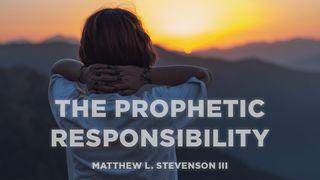He Gave Us Prophets: Dynamics Of The CovenantsSample

Process of Judgment: Leviticus 26:14-39
What processes of judgment did the prophets expect to take place? The prophets learned the process of judgment primarily from Leviticus 26:14-39. In this passage, Moses describes judgment as something that takes place over a long period of time and follows a particular pattern.
Leviticus 26:14-39 makes it clear that God exercises great patience toward His people when they sin. God realizes that His people will rebel and that they will be stubborn, refusing to repent. So in this passage, Moses reveals that God will be very patient with his people. Leviticus 26 divides into five main sections: verses 14-17, 18-20, 21-22, 23-26, and 27-39. Each of these segments begins with God saying this: “If you will not listen to me…” and then He goes on to say what He will do to Israel in judgment. This repetition of “If you will not listen to me” shows that God intended to be patient with His people by giving them many opportunities for repentance.
One of the most succinct descriptions of the patience of God appears within Old Testament prophecy. The prophet Joel spoke of God’s patience in Joel 2 when he called the people to repent. In 2:13, he said these words to Israel:
Return to the Lord your God, for he is gracious and compassionate, slow to anger and abounding in love, and he relents from sending calamity.
The prophets believed very strongly in covenant judgment, but they also believed that Yahweh was very patient with His people.
Just as the five segments of Leviticus 26 tell us that God is patient, they also tell us that God will increase the severity of His judgments. In verses 18, 21, 24 and 28, God warns His people in this way: if they continue to rebel against Him, then He will increase the judgments seven times over.
This dimension of Leviticus 26 tells us that covenant judgment comes in degrees. Sometimes the prophets warned of relatively small judgments, and then they later warned of greater judgments to come. For example, we read of one smaller judgment in the book of Isaiah 38:1:
Put your house in order, because you are going to die; you will not recover.
Now, I’m sure that Hezekiah himself thought this was a great covenant judgment against him, but in terms of the whole nation, it was rather small—it was just one individual suffering the judgment of God. But on the other hand, after Hezekiah refused to submit himself to Yahweh, even after a miraculous deliverance from the attacking Assyrians, Isaiah gave a much more severe judgment. He announced that one day the Babylonians would conquer the entire nation of Judah. In Isaiah 39:6, we read these words:
The time will surely come when everything in your palace … will be carried off to Babylon. Nothing will be left.
This statement was much more severe than the threat against Hezekiah about his personal health. It was a threat against the entire nation. And many prophets would follow this very same pattern. They would speak of increasing judgments.
The last section of Leviticus 26:27-39 warns that the worst judgment to come against the people of God would be an utter devastation of the land and exile from the Land of Promise. Consider the way Moses puts it in Leviticus 26:33:
I will scatter you among the nations and will draw out my sword and pursue you. Your land will be laid waste, and your cities will lie in ruins.
In the minds of Old Testament believers, it was hard to imagine anything worse than this. God had brought Israel to a Land of Promise, a land flowing with milk and honey, and now the prophets were announcing that there was going to be an exile from this land. By the time we come to most biblical prophets, God had already warned time and again that he was going to send his people out of the land. And so we find the prophets announcing that exile was coming.
God is gracious and patient and kind to His people; it takes a long time to make Him angry, but He can be provoked to anger. And so we discover that God does have judgment over His people, but it is a patient and a kind judgment that He exercises over His people.
Scripture
About this Plan

This reading plan explores covenant ideals, judgments and blessings.
More
We would like to thank Third Millennium Ministries for providing this plan. For more information, please visit: http://thirdmill.org/
Related Plans

The Prophetic Responsibility

The Prophet - Every Believer Is Prophetic!

30 Scripture Based Prayers for Your Marriage

Greater Weight of Glory

Find Hope in God's Unfailing Love

Calling Abba: 30 Days of Bible-Based Prayers (Month 1)

Heavenly Fruits

Diapers, Pacifiers, and Other Holy Things

Lighting Up Our City Video 8: Creating a Culture of Evangelism
